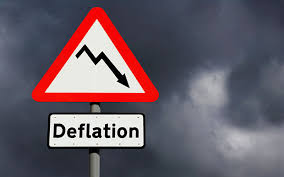Their is an ease of applying Monetary policies in an economy , where there is a moderate amount of inflation. Inflation is good for economic growth and most of the world’s central banks target for 2-3% of inflation rate. But when inflation goes out of hand and prices rises rapidly it leads to hyperinflation. In 2008 Zimbabwe had hyperinflation and due to that the economy collapsed . But when prices of goods starts falling, then it leads to Deflation and Deflation is worse than inflation. In deflation consumers try to hoard their spending in the expectation that things will even cheaper further muting demand and decreasing production.
According to a weekly journal “The Economist”, low or negative inflation is spreading around the world, and it is more of a worry than it sounds. For all the central banks in the rich and developed countries number 2 is a magical number. If price rises at 2% a year, most shoppers can more or less ignore their slow ascent and a touch of inflation is hugely helpful , it gives companies and firms a way to nudge unproductive workers and incentive to invest their earnings. Also it keeps economies away from “Deflation” and the depressing choices- hoarding cash, delaying purchases etc.
But whiff of deflation can be seen even in America,Britain and Canada. Also Japan’s 2.4% rate is set to evaporate and slips back into deflation. Among all, Euro Zone crisis is most striking . Today 15 of the area’s 19 members are in deflation.
One important reason for this could be Oil Prices. There was a sharp decrease in the price of oil from $110 to $60 today . This 45% cut is trickling through economies. This in-fact is not bad because oil prices cut further lowers energy bills, cost of inputs etc. But for the sellers who are selling Durable goods, deflation seems more worrying. Decrease in prices of cars (since oil and cars are complementary goods) , 20% price cut on new motors. In euro Zone prices of electronics also have been falling.
Despite of increase in employment all over the world even in sickly Euro Zone, it has not lead to inflation in the form of higher pay. One possible reason could be that there have been growth in insecure forms of employment , jobs have grown up but worker’s bargaining power is not.
But case in Euro Zone is completely different nothing much has been done to make labour market efficient. Greece has approximately 25% of unemployment. Also falling prices endure, then debt fixed in nominal terms are harder to pay.
That’s why Inflation is good as well as better than Deflation and also this deflation could cost the economy a lot.





16 Comments. Leave new
Nice work.. good efforts!
deflation really worst , terrible , horrible situation for an economy …….
nice article + INFORMATIVE
great work
You explained it well
Nice article.
Good article.
Educative and nicely summed up all the points
Stabilty is required in every sphere-neither hyperinflation nor deflation work for the better of a country’s economy. Well written.
thankyou everyone
Well Explained
As a student of economics, I expected more :/
i will try to be more elaborative in my other articles. 🙂
good effort…..well explained. minified yet effective!
Nice and informative.
Great effort..!
a well structured analysis of the situation around the world!